CLASS stands for Contemplative Landscape Automated Scoring System. And it is the software that enables instant scoring of any digital landscape image according to seven contemplative landscape features:

How was CLASS developed?
The research on CLASS started with the process of operationalization of the concept of contemplative landscapes. This was based on the assumption that each landscape setting (scene, view) has some level of the contemplative values (aka. sensori-emotional values that may influence our emotional states, sense of well-being or even physiological processes.
There are already existing tools that enable recognizing and evaluating the scenic beauty or visual quality of a landscape. However, they are not calibrated to serve for the typically urbanized context, such as urban parks, gardens and different types of areas touched by landscape architecture design. Another problem with so far existing evaluation tools is the problem with expert-based approach. The main limitation for all expert-based tools is the low level of precision, reliability and validity. This means that the differences between responses of different experts about the same landscape are sometimes as big as differences between two different landscape settings.
We wanted to overcome these limitations, and create a new tool, a Contemplative Landscape Model, that we tested for reliability and validity. When our traditional tool was ready, we asked a group of international experts to annotate the set of images, using our tool. The details of that process was published in a paper titled “What makes a landscape contemplative?” [1]The database of their responses served as a training data for our neural network.
After months of testing, we were able to choose the combination of ANN models that would produce the best combined contemplativeness score and created the CLASS scoring system that can evaluate the contemplativeness of landscape images with scores similar to those of experts. The figure below presents the performance of the CLASS prototype in comparison to “real experts”. The detailed process is described in the paper titled “CLASS: Contemplative landscape automated scoring system” [2].
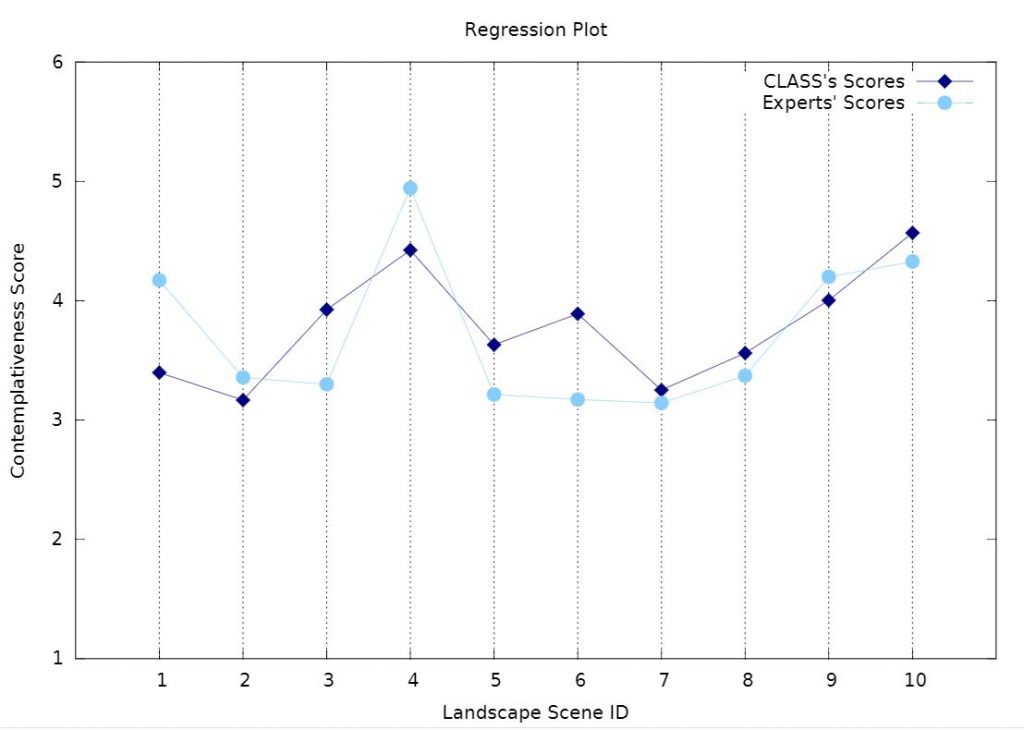
What is CLASS?
We can say that CLASS is an artificial expert’s brain trained to classify the level of contemplativeness of the landscapes, combining the expertise of 10 international academic experts. It recognizes seven key features of a contemplative landscape within an uploaded digital picture, and gives an immediate, objective score for each of the seven features as well as the total contemplative score. CLASS is also constantly learning creating a database with every picture, so the more it works the more precise and intelligent it becomes.
Anybody with a license subscription can access the CLASS via online, where, through the friendly interface they can upload any digital image they want evaluated and obtain instant scoring of the contemplativeness of a picture.
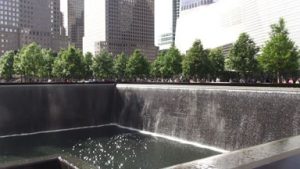

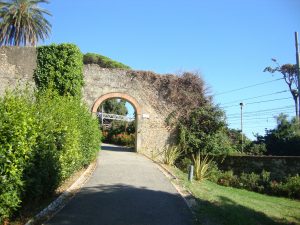
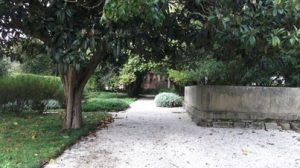
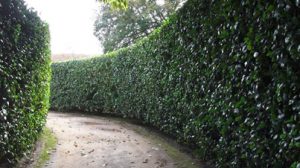
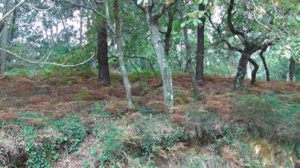
How to select the photographs for CLASS?
CLASS is sensitive only to images of landscapes of urban parks and gardens so it wouldn’t work if we upload a photo of a puppy, or any other than it is not designed for. In order to obtain more precise scores, we recommend to upload a good quality, digital photographs of a clear view over the space, from a ground level (eye level of a standing person) in daylight, and without animals or too many people within the view. Some examples are given aside. The image should be taken in most interesting for us weather conditions, so for example, if we want to see how contemplative is the space in general, we should take a picture in the weather conditions that are the most common, and most likely for largest number of people to be seen.
How much does it cost?
We are a non-profit organization so we consider using of the CLASS as pro-bono approach. However, because of the costs of the servers, and maintenance of the software we will charge private entities who want to use it. The costs of a license subscription can be found here along with the payment method.
Does it really work?
As much as it is surprising and hard to believe, YES! If you don’t believe it, please check it out for free through our demo version!
References:
- Olszewska, A. A., Marques, P. F., Ryan, R. L., & Barbosa, F. (2016). What makes a landscape contemplative?. Environment and Planning B: Planning and Design, 0265813516660716.
- Navickas, L., Olszewska, A., & Mantadelis, T. (2016, June). CLASS: Contemplative landscape automated scoring system. In Control and Automation (MED), 2016 24th Mediterranean Conference on (pp. 1180-1185). IEEE.
Research shows that what we are exposed to passively during the day in the course of our live can have a tremendous impact on our mental health and wellbeing. It is also demonstrated by the research that the exposures to the urban built-up environments is detrimental to our health, and exposure to certain types of natural landscapes can do wonders for our ability to restore our attention, decrease stress levels, improve the cognitive functions, productivity, creative performance and even strengthen the social bonds.
In the urban life there is not much time left for the daily exposures to natural environments, and even if one would visit contemplative parks everyday, in many northern countries, it is usually very gray and cold for large portion of the year. There are also groups of people, in hospitals, nursing homes etc who simply cannot walk out to the park.
Having all these in mind NeuroLandscape is working on the virtually-enabled interventions called VHE, and tested in the real life and lab settings. We are still working on it, but we believe that soon our first products will be released and available for public.
